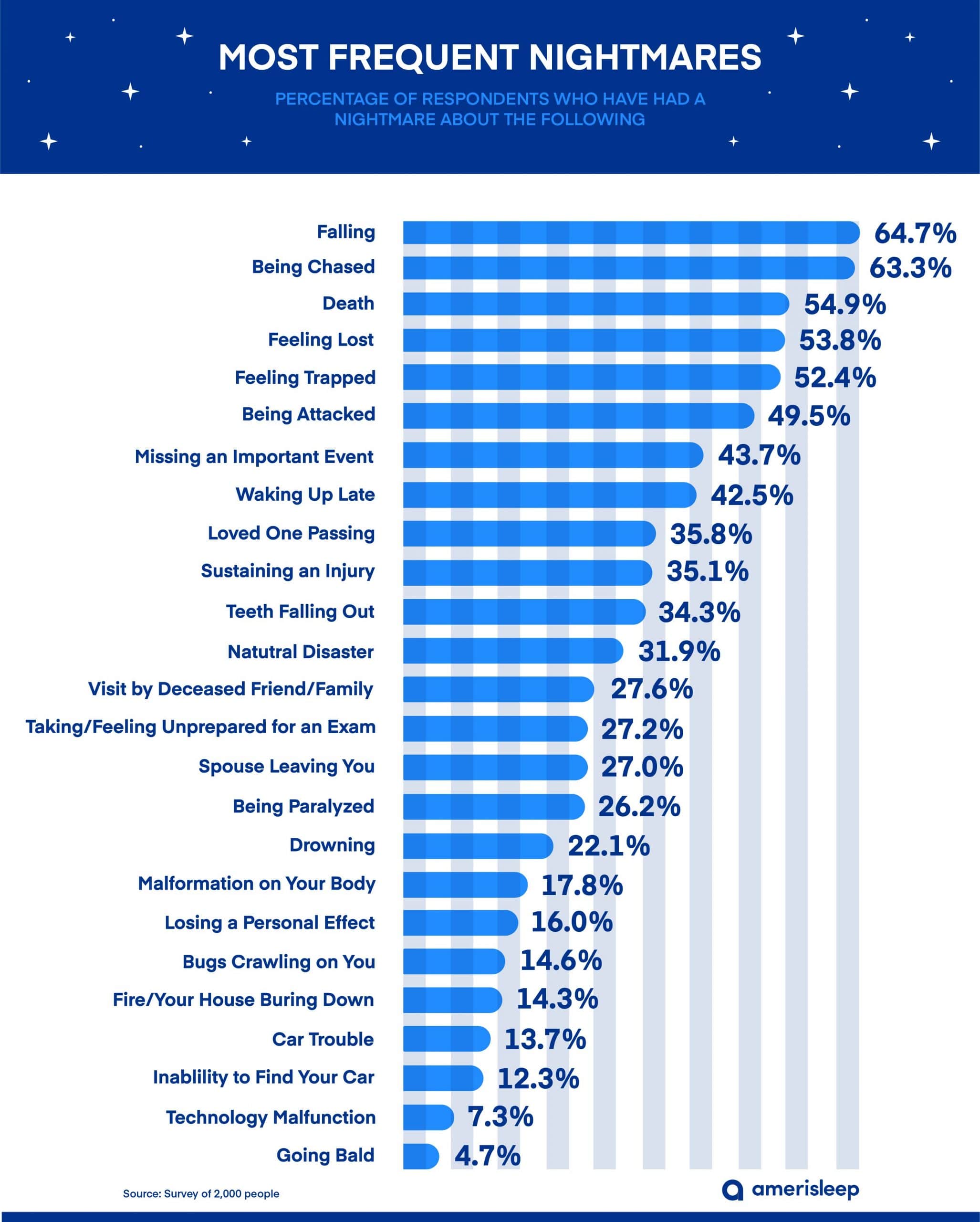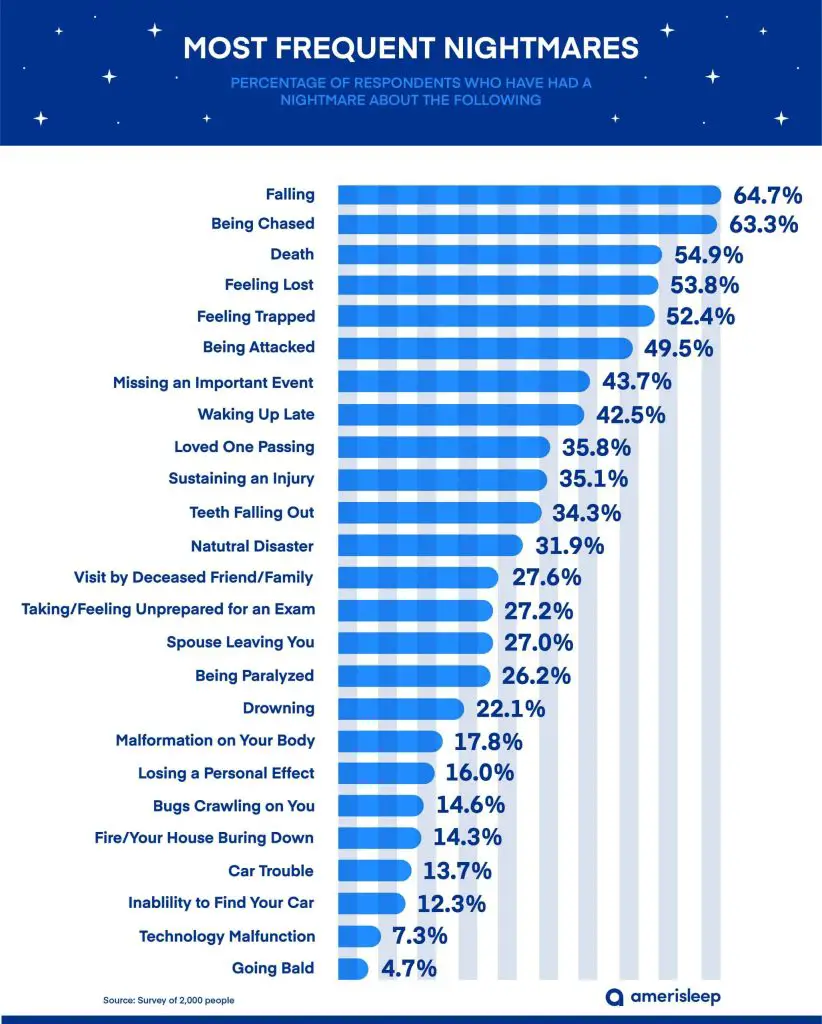Last Updated on April 16, 2023 by Francis
Dreams have the remarkable power to take us to alternate realities and even make us feel real emotions. Many of us have experienced a common feeling of dread or fear upon waking up from a bad dream. But what is the most common bad dream? In this article, we’ll explore what the most common bad dream is, why it’s so common, and how to cope with it.
The most common bad dream is one of being chased or attacked. It can involve being chased by an animal, person, or some unknown force, or being attacked by physical violence, such as being shot or slashed. Other common themes in bad dreams include falling, being paralyzed, being trapped, or the death of a loved one. Bad dreams may have a variety of causes, including stress, anxiety, or traumatic events. In some cases, they may be a sign of an underlying mental health issue. It is important to talk to a mental health professional if bad dreams are interfering with daily life.

Contents
Most Common Nightmares
Dreams can reveal a lot about our unconscious worries and fears. Nightmares, in particular, can give us a glimpse at the things that we are anxious or scared of. One of the most common types of nightmares is the one where we are being chased or attacked.
This type of dream can involve being chased by an animal or a person, or being attacked by an unknown entity. In some cases, the dream may be about being pursued by a figure from our past, such as a teacher or an estranged family member. The feeling of being chased or attacked can be very intense, and it can cause a great sense of anxiety and fear.
These nightmares can occur in any stage of life and can be triggered by a variety of factors, such as stress or anxiety. They can also be a sign of unresolved trauma or a fear of being attacked. While the cause of these nightmares may vary, the feeling of fear and danger that they evoke can be very real.
Causes of Nightmares
Many of us have experienced nightmares at some point in our lives. While some nightmares may be caused by physical or psychological issues, some of the most common causes are stress and anxiety. Stress can trigger nightmares due to the release of cortisol and other hormones, which can affect our sleep patterns and cause us to experience vivid, intense dreams.
Anxiety can also trigger nightmares. If we are feeling anxious or worried about something, this can manifest in our dreams as a feeling of being chased or attacked. Often, these nightmares can be a sign of unresolved trauma or a fear of the unknown. It is important to talk to a therapist or mental health professional if you are having frequent nightmares that are causing distress.
Managing Nightmares
If you are having frequent nightmares, there are a few things that you can do to manage them. One of the most important things is to practice good sleep hygiene. This means making sure that your bedroom is dark, quiet, and comfortable, and avoiding caffeine or alcohol before bed.
It can also be helpful to keep a dream journal, where you can record your nightmares and try to identify any patterns or triggers. If you are feeling anxious or stressed, try to practice relaxation techniques such as deep breathing or stretching before bed.
Finally, it is important to talk to a therapist or mental health professional if your nightmares are causing distress. They can help you to identify the root cause of your nightmares and provide you with effective coping strategies.
The Power of Nightmares
Despite the fear and anxiety that nightmares can evoke, they can also be a powerful tool for self-exploration. By understanding the root causes of our nightmares, we can gain insight into our unconscious worries and fears.
In addition, nightmares can serve as a warning sign that something needs to be addressed in our waking lives. If we are having nightmares that are related to anxiety or unresolved trauma, it can be a sign that we need to seek help or take steps to manage our stress.
The Role of Dreams
Dreams can be a powerful tool for understanding ourselves and our unconscious minds. By understanding the root causes of our nightmares, we can gain insight into our worries and fears and take steps to manage them. By engaging with our dreams and understanding their meaning, we can gain insight into our emotional and psychological states and work to improve our mental health and wellbeing.
Top 6 Frequently Asked Questions
What is the most common type of bad dream?
The most common type of bad dream is a nightmare. Nightmares are vivid, intense dreams that can cause a person to wake up suddenly feeling scared and anxious. Nightmares are often caused by stress, anxiety, or other emotional disturbances in a person’s life. They can also be caused by physical discomfort, such as being too hot or too cold. Nightmares can be recurring, and can cause a person to feel frightened and anxious even after they wake up.
What are the symptoms of a nightmare?
The symptoms of a nightmare can vary from person to person, but generally include feeling scared, anxious, and overwhelmed. People may also experience physical symptoms such as a racing heart, sweating, or trembling. Nightmares may also cause a person to wake up suddenly or be unable to go back to sleep.
What can cause nightmares?
Nightmares can be caused by a variety of factors, including stress, anxiety, depression, substance abuse, medications, and physical discomfort. In some cases, nightmares can also be caused by trauma or a traumatic event.
How can you reduce the risk of having nightmares?
There are several steps you can take to reduce the risk of having nightmares, such as getting enough sleep, reducing stress, avoiding drugs and alcohol, limiting caffeine intake, and managing your emotions. Other strategies include avoiding scary movies or other media, creating a relaxing sleep environment, and journaling before bed.
What should you do if you have a nightmare?
If you have a nightmare, it is important to take steps to reduce its intensity and distressing effects. It can be helpful to focus on calming activities such as deep breathing or mindfulness exercises to reduce the emotional distress that nightmares can cause. It is also important to talk to someone about the dream, as talking about the experience can help reduce the fear and emotional distress associated with it.
What are the long-term effects of nightmares?
The long-term effects of nightmares can vary from person to person. For some people, nightmares can lead to increased anxiety and fear, difficulty sleeping, and feeling scared or overwhelmed even after waking up. Nightmares can also interfere with a person’s daily life and functioning, as they may be reluctant to go to sleep or have difficulty concentrating. In some cases, nightmares can also cause physical health problems, such as headaches or stomachaches.
Most Common Nightmares And What They Mean?
Bad dreams are a common experience, and many people have had a bad dream at one time or another. While they can be unsettling, they are often a sign of underlying stress or anxiety. Recognizing and addressing the source of the stress can help reduce the frequency of bad dreams. While there is no single most common bad dream, understanding the root cause of nightmares can help to reduce their occurrence and put you back on track to a peaceful night’s sleep.






